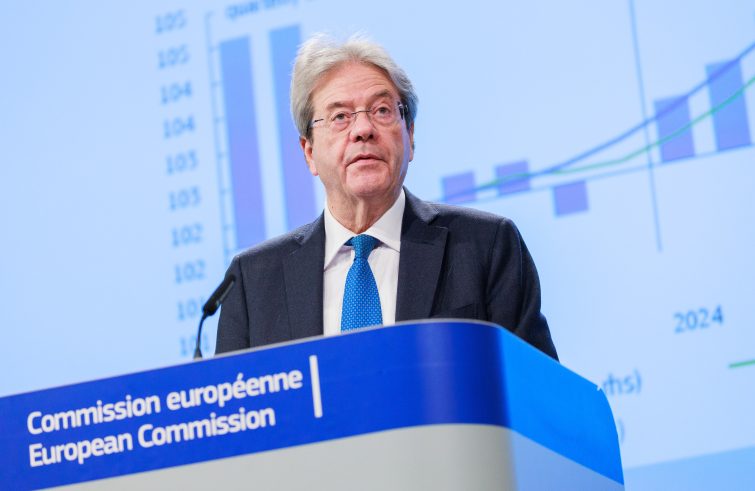
Once again… uncertainty reigns. That, in a nutshell, was the message of the European Commission’s Winter Economic Forecast, presented in Brussels on Thursday, 15 February. The conflicts in Ukraine, in the Middle East and the Red Sea, the volatility in the energy sector and inflation are among the factors that call for caution and, in any case, point to months of a European economy that is far from “exuberant.” Some positive data has finally emerged from the labour market, which seems to be resisting the GDP slump in the 27 EU countries for the time being.
“Economy weaker than expected.” “Following subdued growth last year, the EU economy has entered 2024 on a weaker footing than expected.” The Economic Forecast thus opens with a revised growth outlook, with GDP down to 0.9% in the EU27 for 2024 (the autumn forecast of 1.3% was more optimistic) and to 0.8% (from 1.2%) in the eurozone. “In 2025, economic activity is still expected to expand by 1.7% in the EU and 1.5% in the euro area.”
Recovery is therefore delayed or postponed, based on the Commission’s forecasts.
In contrast, there is positive data on inflation, whose pace is set to slow down faster than projected in the autumn. In fact, the index of consumer price inflation is forecast to fall from 6.3% in 2023 to 3.0% in 2024 and 2.5% in 2025. In the euro zone, it is expected to slow down from 5.4% in 2023 to 2.7% in 2024 and to 2.2% in 2025.
Growth of employment and investments. “The European economy has left behind it an extremely challenging year, in which a confluence of factors severely tested our resilience,” is the first comment of Economy Commissioner Paolo Gentiloni. “The rebound expected in 2024 is set to be more modest than projected three months ago, but to gradually pick up pace.” The rebound in employment is coupled with the fact “that investment is expected to hold up.” “The pace of growth is set to stabilise and inflation to decline to close to the ECB’s 2% target.” Finally, “geopolitical tensions, an ever more unstable climate and a number of crucial elections around the world this year are all factors increasing the uncertainty” over the European economy.
Recession “narrowly avoided.” “In 2023, growth was held back by the erosion of household purchasing power, strong monetary tightening, the partial withdrawal of fiscal support and falling external demand. After narrowly avoiding a technical recession in the second half of last year, prospects for the EU economy in the first quarter of 2024 remain weak”, reads the Commission’s Economic Forecast. “However, economic activity is still expected to accelerate gradually this year. As inflation continues to abate, real wage growth and a resilient labour market should support a rebound in consumption.”
However, the rebound may not be felt, especially in numerical terms, until next year.
“Despite falling profit margins, investment is set to benefit from a gradual easing of credit conditions and the continued implementation of the Recovery and Resilience Facility. In addition, trade with foreign partners is expected to normalise, after a weak performance last year.”
Uncertain global landscape. Commission Vice-President Valdis Dombrovskis confirmed: “After a bruising 2023, the European economy has emerged a little weaker than expected, although the rebound should speed up gradually this year and into 2025. Inflation continues its broad-based decline; real wage growth coupled with a resilient labour market should help consumer demand.” EU funds “will continue to play a vital role in terms of investments.” However, he remarked, “the global landscape remains highly uncertain. We are closely tracking geopolitical tensions, which could have a negative impact on growth and inflation.” “Climate risks and the increasing frequency of extreme weather events also continue to pose threats.”
Energy and… tractors. During the press conference in Brussels, Economy Commissioner Paolo Gentiloni touched on many other topics, often in response to questions from journalists. For example, “the increase in shipping costs in the wake of the Red Sea trade disruptions is expected to have only a marginal impact on inflation. Further disruptions could, however, result in renewed supply bottlenecks that could choke production and push up prices.”
The energy issue was one of the recurring themes.
Oil prices have dropped since last autumn and “are expected to continue to decline gradually in 2024 and 2025.” The farmers’ protest was likewise mentioned: “The Commission is sensitive to the issues raised by farmers and is acting on them. However, I see no potential supply chain disruptions on the horizon as a result of what is happening.”
Germany, Italy, Eastern countries. An analysis of the national economies revealed Germany’s ongoing weakness, whose GDP is forecast to grow by only 0.3% in 2024, before climbing to 1.2% in 2025. Forecasts for France are far better: 0.9% and 1.3% respectively. The data concerning Italy, contained in the Economic Forecasts, point to GDP growth at 0.7% for 2024, before rising to 1.2% next year ( GDP stood at 0.6 in 2023). Inflation in Italy seems to be holding steady: 2.0% in 2024 and 2.3% forecast for 2025. Further positive signs of economic recovery could come from the implementation of the NRP. Spain performs relatively well: 1.7% this year and 2.0% in 2025. More encouraging news comes from the Central and Eastern European countries, with GDP expected to grow between 2 and 3% this year and next: this applies to Croatia, Slovenia, Slovakia, Bulgaria, Hungary, Poland and Romania.











